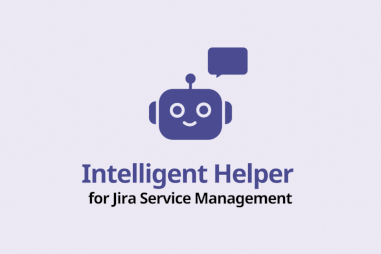Community resources
Community resources
Community resources
Ricksoft's first AI-powered app for Codegeist Unleashed 2023
This is our second time participating in Codegeist, and it's been quite a journey. Our first submission - Secure Custom Fields for Jira - successfully went live on the Marketplace in 2021. However, our decision to participate in this year's Codegeist Unleashed wasn't exactly part of the grand plan. We found ourselves just three weeks away from the submission deadline when the idea struck.
But as they say, necessity is the mother of invention, and we're thrilled to share our story.
Ideation and validation research
Initially, we explored various ideas where AI could be applied to enhance our own experience with Atlassian products. We considered using AI for tasks like decoding a Confluence page, determining action items from meetings, or automating code reviews. The ideas were flowing, but most of these capabilities were already possible with Atlassian Intelligence and other existing apps.
Yeap, that is our stellar ideas backlog! 💡
We decided to take a step back and ask ourselves why we needed these insights and what they would enable us to accomplish. That's when our final and most feasible idea emerged.
As a small team, we lacked a dedicated role to maintain the product knowledge base. We relied on our support agents to gather information about frequent topics after closing a ticket. This process was less than ideal and often resulted in overlooked issues.
Support tickets, whether about technical glitches, product features, or simple requests for assistance, contained a wealth of customer experiences. They serve as a goldmine for knowledge base articles - if we had the time and resources to create them. So whenever we onboarded a new team member, they still have to sift through every support ticket to get up to speed.
🎯 Our goal was simple: streamline this process. An AI-powered app seemed like the perfect solution. Meet: Intelligent Helper for Jira Service Management 🤖
Problem identified
For any product team, the support portal is a treasure trove of customer feedback. Support tickets are windows into user experiences and unique challenges, but collecting and analyzing this feedback is no walk in the park. While several competitor apps existed in the Marketplace, they hadn't quite found their sweet spot in the market. We believed that the true value of AI went beyond just analyzing support tickets. To bring our app to market successfully, we had to nail our product positioning.

With our current iteration, or rather the proof of concept, the Intelligent Helper only scratched the surface of what's possible with support ticket insights.
This Hackathon presented a golden opportunity to dive deeper into this problem space and refine the app further.
When the idea took shape
We began development with a clear MVP in mind: automatically generate insights with references from similar tickets so support agents could quickly draft responses without sifting through information manually.
-
Tech Stack:
Our journey started by building the app's frontend with Forge Custom UI, providing an intuitive and user-friendly interface. On the backend, we relied on AWS hosting, with Python programs powered by LangChain doing the heavy lifting. To maintain a comprehensive issue index, we chose ChromaDB as our database. -
Forge Modules:
We kept the user experience efficient and friendly with Forge modules with the projectSettingsPage module for creating the issue index, while the issuePanel module supports the user interface. -
OpenAI:
Behind the scenes, we utilize OpenAI’s Embeddings API to create issue indexes, making it a breeze for support agents to find relevant tickets. The Chat Completions API made generated reply suggestions possible.
To ensure our app genuinely benefited support agents, we actually installed Intelligent Helper on our own support site. This hands-on approach allowed us to validate its functionality, make prompt adjustments, and squash pesky bugs. The result? Our app significantly boosted support team productivity, adding more value to ticket analysis beyond the native "Similar requests" feature in Jira Service Management.
Lessons learned
In our journey to integrate Forge and OpenAI, we faced a challenge.
Forge's processing time limit of 25 seconds clashed with the response times of the OpenAI Chat Completions API. We devised temporary solutions but recognized the need to transition to a design that would allow Forge to call the API as an asynchronous job by setting up an intermediary server.
We also delved deep into the world of AI Chat services, particularly the RAG Framework and LangChain's remarkable implementation of LLM. This experience opened our eyes to the vast possibilities of AI and left us excited about the future.
Final words of appreciation
Overall, this ambitious endeavor was no walk in the park, but our lead engineer's unwavering commitment and the team's hard work paid off. In just two weeks, while simultaneously navigating a product release plan, we delivered a proof of concept that we are incredibly proud of.
With the Intelligent Helper for Jira Service Management, we've taken a step towards revolutionizing the support experience, and we're eager to see how this app will evolve and benefit support agents and customers in the future.
Watch our submission video to get a sneak peak of the Intelligent Helper app: https://devpost.com/software/intelligent-helper-ai-suggest-for-jsm-support-agents
If you find the idea interesting or if you have any suggestions for us, please feel free to leave a comment as well. We’d really appreciate it!
Was this helpful?
Thanks!
Linh Pham_Ricksoft_Inc

About this author
Product Manager
Ricksoft Inc
Malaysia
31 accepted answers
Atlassian Community Events
- FAQ
- Community Guidelines
- About
- Privacy policy
- Notice at Collection
- Terms of use
- © 2024 Atlassian








1 comment